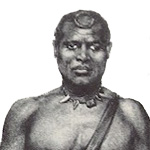|
|
|
|
| |
| Lobengula,
King of the Matebele |
|
Lobengula, "He who was
sick", was the son of Mzilikazi, son
of Matshobana, son of Mangete, son of Ngululu, son of
Langa, son of Zimangele; all descendants of the Khumalo
Dynasty. Lobengula’s mother was a Princess of the Swazi
House of Sobhuza I. Lobengula ruled the Matebele
Kingdom from the time of the death of Mzilikazi
1868, until the demise of the Kingdom in the Mid 1890's. |
Lobengula
was in some ways lucky to have lived long enough
to ascend to the throne. It is said that, Lobengula
and Nkulumane along with their mothers were sentenced to
death by their father, Mzilikazi.
But however, Mncumbatha Khumalo felt pity for him,
released him and instructed him to go and hide.
Mncumbatha Khumalo returned and told the King that he
had followed his (the King) directive. The King
eventually found out, and had mercy on Lobengula,
but he didnt want Lobengula
to enter his court yard. One of the Chief was asked to
take care of Lobengula, as a
result Lobengula did not get
first hand experience of how state affairs are run.
|
|
|
| On September 12 1868, King
Mzilikazi of the Ndebele
state died and his remains were put in a cave at
Entumbane, on the northern peripheries of the Matopo
Hills. After some debates, disagreement and agreements
the throne was given to Lobengula. |
 |
A section of the Ndebele
nation, however, was opposed to Lobengula,
possibly stirred up by some instances by other
members of the royal family who wished to have the
crown for themselves, refused to accept any king
but Nkulumane. The section argued that Lobengula
was born of Swazi woman, and therefore could not
ascend to the throne. It was easy to see,
therefore, that there was but one way to decide
the question, - a fearful battle was to be
fought between the two opposing parties. |
|
| The result of the battle was
that Lobengula and the
warriors supporting him gained the victory, and the
rebels were crushed, so much so, that they consented to Lobengula
becoming king without further protests. According to Ndebele
custom, a new king had to establish his own royal palace
and town. Consequently, Lobengula
left King Mzilkazi's last
capital of Mhlahlandlela to establish his own town,
which eventually became known as Bulawayo. |
|
Mzilikazi’s
friendship with Robert Moffat was a most significant
influence in the fate of his Kingdom after his reign. Mzilikazi
had very little time for Christianity, but because of
his respect for and trust of Moffat he allowed himself
to be persuaded to admit the Matebele
mission to his
realm. Once established there he and his successor
Lobengula always gave protection to the missionaries.
Lobengula reigned well and entertained Europeans
sparingly, one recorded account is that J.C.
Chadwick. J. Cooper Chadwick in his book THREE
YEARS WITH LOBENGULA (London, Cassell, 1894,
160pp) writes: "The King is by far the most
intelligent man in the nation and his memory is
marvelous".
Lobengula's
sympathies and soft spot for the missionaries which he
had inherited from his Father, King
Mzilikazi, eventually led to the downfall of the Matebele
Kingdom. Lobengula's
Kingdom, encompassed both Matebeleland and Mashonaland,
but this country was rich in natural resources, which
was the interest of European Settlers. Through the
various concessions and treaties, Lobengula
was tricked into signing over his Kingdom to the
authority of Cecil John Rhodes. |
| |
|
| Of all the concessions, the
most critical was the Rudd Concession, setting the
stage for Rhodes’ British South Africa Company to
mastermind the coup d’ grace in the form of the Rudd
Concession. The Rudd Concession conferred sweeping
commercial and legal powers on Rhodes. Furthermore to in
order to weaken any possible resolve on Lobengula’s
part, scouts in the Rudd party secretly agitated the
neighboring Shona, who believed that the emerging
problems were precipitated by the Matebele. |
| Lobengula
mounted a number of
armed attempts to counter the takeover of his nation. In
July 1893, the Matebele War broke out when a party of
Lobengula’s warriors raided a Mashona village near
Fort Victoria (now Masvingo), threatening a camp of
British settlers. The British High Commissioner
authorized the then present military force to respond
and indeed to continue the advance until all of Matebeleland was occupied and under strict British
Control. |
|
|
| Lobengula
and a small remnant
of his once powerful Impi were driven to a point
approximately seventy kilometers north of the Zambesi
River. Sir James McDonald, in his book RHODES –
A LIFE (London: Philip Allan 1928, 403pp)
describes the now very ill Lobengula’s last hours:
"He felt his end was near, and calling together
those faithful indunas and warriors who still remained
with him, he said. . . go now all of you to Rhodes and
seek his protection. He will be your chief and friend.
To the fighting men present he said :You have done your
best, my soldiers; you can help me no more. I thank you
all. Go now to your kraals and Mjan (the General of all
of Lobengula’s Impi) the greatest of you all, will go
to Rhodes, who will make things all right for you. To
all of you I say "Hambani kuhle" – go in
peace!" Before twenty-four hours had elapsed,
Lobengula was no more and Mjan. . . in due course
reached Bulawayo and gave this account of his last
hours. |
|
|
| Related
documents: |
| The fall of Lobengula, King of Matebele |
| The
Khumalo Royal family |
| |
| |
| If you feel this is not an accurate profile and
you have a more accurate one, or you have a clarification , you can submit your version of the Profile here |
|
|
|
|
| |
|